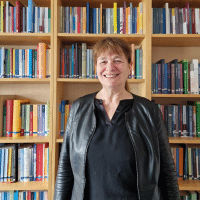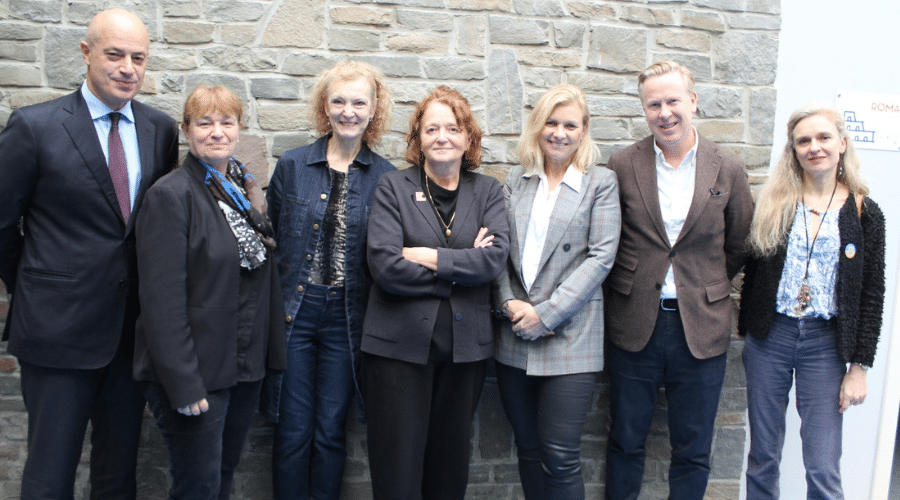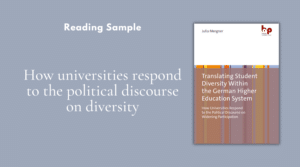On 5th November 2024, the Federation of European Publishers (FEP) elected its new board, welcoming publisher Barbara Budrich as a new member. In an interview, she shares why she sought this position, and which issues she believes are most pressing.
Dear Barbara, what is the Federation of European Publishers (FEP), and what role does the board play?
The FEP is the umbrella organisation for publishers’ associations across Europe. With 30 members, the Federation of European Publishers represents the largest sector of Europe’s cultural and creative industries. Our focus includes issues such as ecological sustainability, accessibility of e-books for people with visual impairments or reading difficulties, as well as AI, copyright, advocacy for freedom of expression, and fostering a reading society – among many other topics.
The board’s role is to work alongside the FEP’s small team of full-time staff to prepare and follow up on major meetings, drive initiatives on key topics, establish working groups if needed, and engage in dialogue with policymakers, among other tasks.
What motivated you to run for the FEP board?
I wouldn’t have thought of it on my own. My colleagues from the German Publishers and Booksellers Association (Börsenverein des Deutschen Buchhandels) encouraged me to apply. Becoming more involved at the European level and representing publishers – particularly independent, value-driven academic publishers – is a goal I find worthwhile. Balancing this with my work as a publisher will undoubtedly be a challenge timewise, but I hope it will be a rewarding one.
What issues are most urgent for you? What are the biggest challenges right now?
There are many large and small issues I consider important. Sustainability is a key focus. The EU Deforestation Regulation (EUDR), for instance, aims to protect forests – a vital and commendable goal that we must fully support! However, its implementation is complex, with many details still unclear. For the FEP, this involves acting as a translator between publishers as well as other stakeholders and the EU administration, bridging practical business concerns with administrative and legal intricacies.
Another issue I often think about is the devaluation of publishers’ work. Most large language models (LLM) for AI have been trained using stolen e-book content – benefiting big tech corporations only as far as finances are concerned. Meanwhile, in some countries, national libraries seem to think it’s a good idea to use e-books in their collections for their own LLM development. Fair compensation for authors, publishers, and other copyright holders is hardly more than an afterthought in such cases. It’s crucial to counter the perception that all content should be free. Authors make a living from their writing, and most publishers rely on their publications for their financial survival. Neither authors nor publishers can exist on goodwill alone. So, on the one hand, we have large tech companies with equally large gains, while authors and publishers are expected to give without remuneration. That doesn’t sound right.
Which of these issues do you consider the most urgent?
In my opinion, ecological sustainability must go to the top of our lists alongside our efforts towards a culture of reading throughout society.
As regards ecological issues, businesses have another year under the EU timeline to complete the paperwork for the Deforestation Regulation. Companies are also preparing sustainability reports (ESG reports) according to EU legislation – our own report for 2023 is nearly finished –, and we are implementing the ban on mineral oil-based printing inks. These are just first steps; there is much more we must achieve together!
On the other hand, all these crucial issues risk disappearing from the agenda if those driven by narrow self-interest gain power. Be it political threats from the right or left, within Europe or beyond, what we need to preserve our planet, and thus, our physical livelihood, is openness, tolerance, empathy, and collective action. While some publications may promote extremism, literary diversity, education, and knowledge are essential tools in combating the destructive blindness of selfishness and hate. Providing such tools has always been the mission of many authors and publishers.
In this sense, perhaps the most important task is to promote reading in its most enriching forms, allowing imagination to flourish alongside empathy. For me, both ecological sustainability and fostering a reading culture are equally urgent priorities – and both require persistent attention and unwavering dedication, not just in my role on the FEP board.
About Barbara Budrich
 Barbara Budrich, M.A., has been involved in academic publishing since childhood and has been an independent publisher since 2004. She is also trainer and coach for academic writing and publishing in her training company, budrich training, and has also written a number of books and articles. Since 2015, she has been recognised as a role model entrepreneur by Germany’s Federal Ministry for Economic Affairs and Climate Action.
Barbara Budrich, M.A., has been involved in academic publishing since childhood and has been an independent publisher since 2004. She is also trainer and coach for academic writing and publishing in her training company, budrich training, and has also written a number of books and articles. Since 2015, she has been recognised as a role model entrepreneur by Germany’s Federal Ministry for Economic Affairs and Climate Action.
© Foto FEP Board 2024-2026: Federation of European Publishers, from left to right: Phaedon Kidoniatis, Barbara Budrich, Renate Punka, Anne Bergman-Tahon, Sonia Draga, Jesper Monthán, Catherine Blache | Picture Barbara Budrich: private

